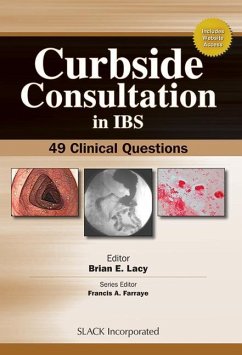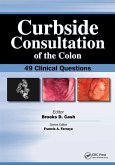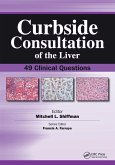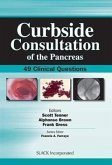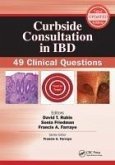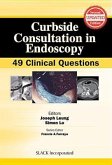- Broschiertes Buch
- Merkliste
- Auf die Merkliste
- Bewerten Bewerten
- Teilen
- Produkt teilen
- Produkterinnerung
- Produkterinnerung
Curbside Consultation in IBS: 49 Clinical Questions provides quick and direct answers to the thorny questions commonly posed during a "curbside consultation" between colleagues.
Andere Kunden interessierten sich auch für
![Curbside Consultation of the Colon Curbside Consultation of the Colon]() Curbside Consultation of the Colon163,99 €
Curbside Consultation of the Colon163,99 €![Curbside Consultation of the Liver Curbside Consultation of the Liver]() Curbside Consultation of the Liver166,99 €
Curbside Consultation of the Liver166,99 €![Curbside Consultation of the Pancreas Curbside Consultation of the Pancreas]() Curbside Consultation of the Pancreas166,99 €
Curbside Consultation of the Pancreas166,99 €![Curbside Consultation in GERD Curbside Consultation in GERD]() Curbside Consultation in GERD161,99 €
Curbside Consultation in GERD161,99 €![Curbside Consultation in IBD Curbside Consultation in IBD]() David T. RubinCurbside Consultation in IBD173,99 €
David T. RubinCurbside Consultation in IBD173,99 €![Curbside Consultation in GI Cancer for the Gastroenterologist Curbside Consultation in GI Cancer for the Gastroenterologist]() Douglas AdlerCurbside Consultation in GI Cancer for the Gastroenterologist167,99 €
Douglas AdlerCurbside Consultation in GI Cancer for the Gastroenterologist167,99 €![Curbside Consultation in Endoscopy Curbside Consultation in Endoscopy]() Joseph LeungCurbside Consultation in Endoscopy167,99 €
Joseph LeungCurbside Consultation in Endoscopy167,99 €-
-
-
Curbside Consultation in IBS: 49 Clinical Questions provides quick and direct answers to the thorny questions commonly posed during a "curbside consultation" between colleagues.
Hinweis: Dieser Artikel kann nur an eine deutsche Lieferadresse ausgeliefert werden.
Hinweis: Dieser Artikel kann nur an eine deutsche Lieferadresse ausgeliefert werden.
Produktdetails
- Produktdetails
- Verlag: CRC Press
- Seitenzahl: 294
- Erscheinungstermin: 15. April 2011
- Englisch
- Abmessung: 254mm x 178mm x 16mm
- Gewicht: 558g
- ISBN-13: 9781556429859
- ISBN-10: 1556429851
- Artikelnr.: 33659315
- Herstellerkennzeichnung
- Produktsicherheitsverantwortliche/r
- Europaallee 1
- 36244 Bad Hersfeld
- gpsr@libri.de
- Verlag: CRC Press
- Seitenzahl: 294
- Erscheinungstermin: 15. April 2011
- Englisch
- Abmessung: 254mm x 178mm x 16mm
- Gewicht: 558g
- ISBN-13: 9781556429859
- ISBN-10: 1556429851
- Artikelnr.: 33659315
- Herstellerkennzeichnung
- Produktsicherheitsverantwortliche/r
- Europaallee 1
- 36244 Bad Hersfeld
- gpsr@libri.de
Brian E. Lacy, PhD, MD is currently an Associate Professor of Medicine at Dartmouth Medical School, and Director of the GI Motility Laboratory at the Dartmouth-Hitchcock Medical Center in Lebanon, New Hampshire. Dr. Lacy's clinical and basic science research interests focus on disorders of gastrointestinal motility, with an emphasis on irritable bowel syndrome, dyspepsia, gastroparesis, acid reflux disease, constipation, intestinal pseudo-obstruction, achalasia, and visceral pain. He is the author of numerous articles and textbook chapters on gastrointestinal motility disorders and functional bowel disorders. Dr. Lacy is a reviewer for a number of scientific journals and is a member of a number of different scientific organizations, including the American College of Gastroenterology, the American Gastroenterology Association, the American Motility Society, and the Functional Brain-Gut Research Group. Dr. Lacy is the co-author of a book for the general public on acid reflux disease, Healing Heartburn, and is the author of Making Sense of IBS, a book for the general public on irritable bowel syndrome. Dr. Lacy received his doctorate in cell biology from Georgetown University in Washington, DC, and his medical degree from the University of Maryland in Baltimore. Dr. Lacy was a resident in internal medicine at the Dartmouth-Hitchcock Medical Center in Lebanon, NH, where he continued his training as Chief Resident and as a Fellow in Gastroenterology. He is board certified in both internal medicine and gastroenterology.
Dedication Acknowledgments About the Editor Contributing Authors Foreword
Introduction Section I: Epidemiology and Natural History Question 1: How
Common Is IBS? Question 2: What Factors Are Associated With IBS and
Functional Abdominal Pain in Children? Question 3: What Is the Natural
History of IBS? Section II: Diagnosis and Patient Impact Question 4: How
Can I Diagnose IBS? Question 5: How Do I Distinguish IBS Constipation From
Other Types of Constipation? Question 6: What Tests Are Required to Make
the Diagnosis of IBS? Question 7: What Is the Value of Performing a
Colonoscopy in Patients With IBS? Question 8: Can a Blood Test Diagnose
IBS? Question 9: What Prompts Patients With IBS to Seek Out Medical Care?
Question 10: What Distinguishes a Patient With Mild IBS From a Patient With
Severe IBS? Question 11: Why Is IBS Important to Treat? Section III: The
Pathophysiology of IBS Question 12: What Is the Pathophysiology of IBS?
Question 13: Are There Risk Factors for Developing IBS? Question 14: Why Is
Bloating Such a Problem in Patients With IBS? Question 15: What Is the Role
of Stress in IBS? Question 16: Does Anxiety or Depression Cause IBS?
Question 17: IBS and the Menstrual Cycle: What Is the Relationship?
Question 18: How Does an Infection Cause IBS? Question 19: Is There a
Relationship Between Surgery and IBS? Question 20: Is There an Association
Between IBS and IBD? Question 21: What Is the Role of Bacterial Overgrowth
in IBS Patients? Section IV: The Association of IBS With Other Medical
Conditions Question 22: How Common Is Celiac Disease in Patients With IBS?
Question 23: Functional Dyspepsia and IBS: One Disease or Two? Question 24:
What Is the Relationship Between GERD and IBS? Question 25: What Other
Common GI Disorders Occur in Patients With IBS? Question 26: From Which
Nongastrointestinal Disorders Are Patients With IBS Most Likely to Suffer?
Question 27: Is Fecal Incontinence More Common in Patients With IBS?
Question 28: How Do I Evaluate and Treat Pelvic Floor Dysfunction in My
Patients With IBS? Section V: Treatment for IBS Question 29: What Key
Educational Points Do I Need to Convey to My Patients With IBS? Question
30: What Dietary Recommendations Should I Make to My Patients With IBS?
Question 31: What Is the Relationship Between Fructose Intolerance and IBS?
Question 32: What Is the Role of Fiber in Patients With IBS? Question 33:
What Is the Placebo Response and Why Is it so High in Patients With IBS?
Question 34: Which Patient With IBS Is Likely to Benefit From Smooth Muscle
Antispasmodics? Question 35: What Is the Role of Tricyclic Antidepressants
in the Treatment of IBS? Question 36: What Is the Role of SSRIs in the
Treatment of IBS? Question 37: What Is the Role of Rifaximin in the
Treatment of IBS? Question 38: What Is Lubiprostone and When Should I Use
it in My Patients With IBS? Question 39: What Is the Role of Antidiarrheal
Agents in Patients With IBS? Question 40: What Is Alosetron and How Can I
Use It? Question 41: What Are Probiotics and Do They Work in IBS? Question
42: Which Probiotics Are Best for Patients With IBS? Question 43:
Linaclotide-What Is it and Why Might it Help My Patients With IBS? Question
44: Will Acupuncture Help My Patients With IBS? Question 45: Will
Hypnotherapy Help My Patients With IBS? Question 46: What Is Behavioral
Therapy and Will it Help My Patients With IBS? Question 47: IBS and CAM:
What Options Are Available? Question 48: What Is the Best Approach for
Treating Abdominal Pain in Patients With IBS? Section VI: What Does the
Future Hold? Question 49: What Medications Are on the Horizon for the
Treatment of IBS? Michael Camilleri, MD Financial Disclosures Index
Introduction Section I: Epidemiology and Natural History Question 1: How
Common Is IBS? Question 2: What Factors Are Associated With IBS and
Functional Abdominal Pain in Children? Question 3: What Is the Natural
History of IBS? Section II: Diagnosis and Patient Impact Question 4: How
Can I Diagnose IBS? Question 5: How Do I Distinguish IBS Constipation From
Other Types of Constipation? Question 6: What Tests Are Required to Make
the Diagnosis of IBS? Question 7: What Is the Value of Performing a
Colonoscopy in Patients With IBS? Question 8: Can a Blood Test Diagnose
IBS? Question 9: What Prompts Patients With IBS to Seek Out Medical Care?
Question 10: What Distinguishes a Patient With Mild IBS From a Patient With
Severe IBS? Question 11: Why Is IBS Important to Treat? Section III: The
Pathophysiology of IBS Question 12: What Is the Pathophysiology of IBS?
Question 13: Are There Risk Factors for Developing IBS? Question 14: Why Is
Bloating Such a Problem in Patients With IBS? Question 15: What Is the Role
of Stress in IBS? Question 16: Does Anxiety or Depression Cause IBS?
Question 17: IBS and the Menstrual Cycle: What Is the Relationship?
Question 18: How Does an Infection Cause IBS? Question 19: Is There a
Relationship Between Surgery and IBS? Question 20: Is There an Association
Between IBS and IBD? Question 21: What Is the Role of Bacterial Overgrowth
in IBS Patients? Section IV: The Association of IBS With Other Medical
Conditions Question 22: How Common Is Celiac Disease in Patients With IBS?
Question 23: Functional Dyspepsia and IBS: One Disease or Two? Question 24:
What Is the Relationship Between GERD and IBS? Question 25: What Other
Common GI Disorders Occur in Patients With IBS? Question 26: From Which
Nongastrointestinal Disorders Are Patients With IBS Most Likely to Suffer?
Question 27: Is Fecal Incontinence More Common in Patients With IBS?
Question 28: How Do I Evaluate and Treat Pelvic Floor Dysfunction in My
Patients With IBS? Section V: Treatment for IBS Question 29: What Key
Educational Points Do I Need to Convey to My Patients With IBS? Question
30: What Dietary Recommendations Should I Make to My Patients With IBS?
Question 31: What Is the Relationship Between Fructose Intolerance and IBS?
Question 32: What Is the Role of Fiber in Patients With IBS? Question 33:
What Is the Placebo Response and Why Is it so High in Patients With IBS?
Question 34: Which Patient With IBS Is Likely to Benefit From Smooth Muscle
Antispasmodics? Question 35: What Is the Role of Tricyclic Antidepressants
in the Treatment of IBS? Question 36: What Is the Role of SSRIs in the
Treatment of IBS? Question 37: What Is the Role of Rifaximin in the
Treatment of IBS? Question 38: What Is Lubiprostone and When Should I Use
it in My Patients With IBS? Question 39: What Is the Role of Antidiarrheal
Agents in Patients With IBS? Question 40: What Is Alosetron and How Can I
Use It? Question 41: What Are Probiotics and Do They Work in IBS? Question
42: Which Probiotics Are Best for Patients With IBS? Question 43:
Linaclotide-What Is it and Why Might it Help My Patients With IBS? Question
44: Will Acupuncture Help My Patients With IBS? Question 45: Will
Hypnotherapy Help My Patients With IBS? Question 46: What Is Behavioral
Therapy and Will it Help My Patients With IBS? Question 47: IBS and CAM:
What Options Are Available? Question 48: What Is the Best Approach for
Treating Abdominal Pain in Patients With IBS? Section VI: What Does the
Future Hold? Question 49: What Medications Are on the Horizon for the
Treatment of IBS? Michael Camilleri, MD Financial Disclosures Index
Dedication Acknowledgments About the Editor Contributing Authors Foreword
Introduction Section I: Epidemiology and Natural History Question 1: How
Common Is IBS? Question 2: What Factors Are Associated With IBS and
Functional Abdominal Pain in Children? Question 3: What Is the Natural
History of IBS? Section II: Diagnosis and Patient Impact Question 4: How
Can I Diagnose IBS? Question 5: How Do I Distinguish IBS Constipation From
Other Types of Constipation? Question 6: What Tests Are Required to Make
the Diagnosis of IBS? Question 7: What Is the Value of Performing a
Colonoscopy in Patients With IBS? Question 8: Can a Blood Test Diagnose
IBS? Question 9: What Prompts Patients With IBS to Seek Out Medical Care?
Question 10: What Distinguishes a Patient With Mild IBS From a Patient With
Severe IBS? Question 11: Why Is IBS Important to Treat? Section III: The
Pathophysiology of IBS Question 12: What Is the Pathophysiology of IBS?
Question 13: Are There Risk Factors for Developing IBS? Question 14: Why Is
Bloating Such a Problem in Patients With IBS? Question 15: What Is the Role
of Stress in IBS? Question 16: Does Anxiety or Depression Cause IBS?
Question 17: IBS and the Menstrual Cycle: What Is the Relationship?
Question 18: How Does an Infection Cause IBS? Question 19: Is There a
Relationship Between Surgery and IBS? Question 20: Is There an Association
Between IBS and IBD? Question 21: What Is the Role of Bacterial Overgrowth
in IBS Patients? Section IV: The Association of IBS With Other Medical
Conditions Question 22: How Common Is Celiac Disease in Patients With IBS?
Question 23: Functional Dyspepsia and IBS: One Disease or Two? Question 24:
What Is the Relationship Between GERD and IBS? Question 25: What Other
Common GI Disorders Occur in Patients With IBS? Question 26: From Which
Nongastrointestinal Disorders Are Patients With IBS Most Likely to Suffer?
Question 27: Is Fecal Incontinence More Common in Patients With IBS?
Question 28: How Do I Evaluate and Treat Pelvic Floor Dysfunction in My
Patients With IBS? Section V: Treatment for IBS Question 29: What Key
Educational Points Do I Need to Convey to My Patients With IBS? Question
30: What Dietary Recommendations Should I Make to My Patients With IBS?
Question 31: What Is the Relationship Between Fructose Intolerance and IBS?
Question 32: What Is the Role of Fiber in Patients With IBS? Question 33:
What Is the Placebo Response and Why Is it so High in Patients With IBS?
Question 34: Which Patient With IBS Is Likely to Benefit From Smooth Muscle
Antispasmodics? Question 35: What Is the Role of Tricyclic Antidepressants
in the Treatment of IBS? Question 36: What Is the Role of SSRIs in the
Treatment of IBS? Question 37: What Is the Role of Rifaximin in the
Treatment of IBS? Question 38: What Is Lubiprostone and When Should I Use
it in My Patients With IBS? Question 39: What Is the Role of Antidiarrheal
Agents in Patients With IBS? Question 40: What Is Alosetron and How Can I
Use It? Question 41: What Are Probiotics and Do They Work in IBS? Question
42: Which Probiotics Are Best for Patients With IBS? Question 43:
Linaclotide-What Is it and Why Might it Help My Patients With IBS? Question
44: Will Acupuncture Help My Patients With IBS? Question 45: Will
Hypnotherapy Help My Patients With IBS? Question 46: What Is Behavioral
Therapy and Will it Help My Patients With IBS? Question 47: IBS and CAM:
What Options Are Available? Question 48: What Is the Best Approach for
Treating Abdominal Pain in Patients With IBS? Section VI: What Does the
Future Hold? Question 49: What Medications Are on the Horizon for the
Treatment of IBS? Michael Camilleri, MD Financial Disclosures Index
Introduction Section I: Epidemiology and Natural History Question 1: How
Common Is IBS? Question 2: What Factors Are Associated With IBS and
Functional Abdominal Pain in Children? Question 3: What Is the Natural
History of IBS? Section II: Diagnosis and Patient Impact Question 4: How
Can I Diagnose IBS? Question 5: How Do I Distinguish IBS Constipation From
Other Types of Constipation? Question 6: What Tests Are Required to Make
the Diagnosis of IBS? Question 7: What Is the Value of Performing a
Colonoscopy in Patients With IBS? Question 8: Can a Blood Test Diagnose
IBS? Question 9: What Prompts Patients With IBS to Seek Out Medical Care?
Question 10: What Distinguishes a Patient With Mild IBS From a Patient With
Severe IBS? Question 11: Why Is IBS Important to Treat? Section III: The
Pathophysiology of IBS Question 12: What Is the Pathophysiology of IBS?
Question 13: Are There Risk Factors for Developing IBS? Question 14: Why Is
Bloating Such a Problem in Patients With IBS? Question 15: What Is the Role
of Stress in IBS? Question 16: Does Anxiety or Depression Cause IBS?
Question 17: IBS and the Menstrual Cycle: What Is the Relationship?
Question 18: How Does an Infection Cause IBS? Question 19: Is There a
Relationship Between Surgery and IBS? Question 20: Is There an Association
Between IBS and IBD? Question 21: What Is the Role of Bacterial Overgrowth
in IBS Patients? Section IV: The Association of IBS With Other Medical
Conditions Question 22: How Common Is Celiac Disease in Patients With IBS?
Question 23: Functional Dyspepsia and IBS: One Disease or Two? Question 24:
What Is the Relationship Between GERD and IBS? Question 25: What Other
Common GI Disorders Occur in Patients With IBS? Question 26: From Which
Nongastrointestinal Disorders Are Patients With IBS Most Likely to Suffer?
Question 27: Is Fecal Incontinence More Common in Patients With IBS?
Question 28: How Do I Evaluate and Treat Pelvic Floor Dysfunction in My
Patients With IBS? Section V: Treatment for IBS Question 29: What Key
Educational Points Do I Need to Convey to My Patients With IBS? Question
30: What Dietary Recommendations Should I Make to My Patients With IBS?
Question 31: What Is the Relationship Between Fructose Intolerance and IBS?
Question 32: What Is the Role of Fiber in Patients With IBS? Question 33:
What Is the Placebo Response and Why Is it so High in Patients With IBS?
Question 34: Which Patient With IBS Is Likely to Benefit From Smooth Muscle
Antispasmodics? Question 35: What Is the Role of Tricyclic Antidepressants
in the Treatment of IBS? Question 36: What Is the Role of SSRIs in the
Treatment of IBS? Question 37: What Is the Role of Rifaximin in the
Treatment of IBS? Question 38: What Is Lubiprostone and When Should I Use
it in My Patients With IBS? Question 39: What Is the Role of Antidiarrheal
Agents in Patients With IBS? Question 40: What Is Alosetron and How Can I
Use It? Question 41: What Are Probiotics and Do They Work in IBS? Question
42: Which Probiotics Are Best for Patients With IBS? Question 43:
Linaclotide-What Is it and Why Might it Help My Patients With IBS? Question
44: Will Acupuncture Help My Patients With IBS? Question 45: Will
Hypnotherapy Help My Patients With IBS? Question 46: What Is Behavioral
Therapy and Will it Help My Patients With IBS? Question 47: IBS and CAM:
What Options Are Available? Question 48: What Is the Best Approach for
Treating Abdominal Pain in Patients With IBS? Section VI: What Does the
Future Hold? Question 49: What Medications Are on the Horizon for the
Treatment of IBS? Michael Camilleri, MD Financial Disclosures Index

